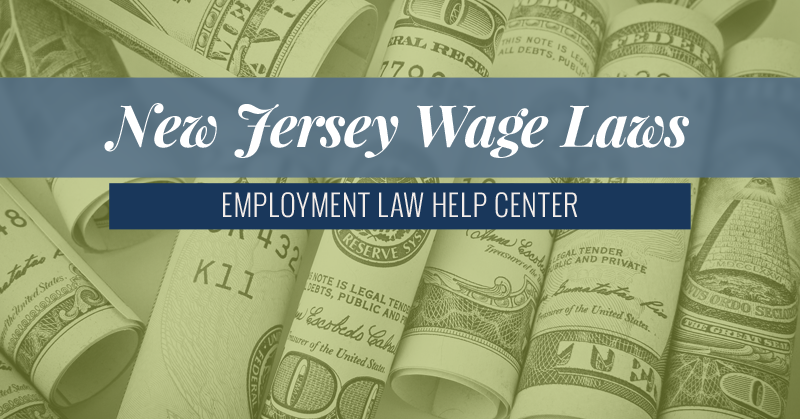New Jersey Wage Laws
State and federal wage and hours laws set the basic standards for employee pay and time worked, and the New Jersey State Wage and Hour Law establishes a state minimum wage and overtime rate for all employees in New Jersey who are covered by the Fair Labor Standards Act. In addition to minimum wage and overtime, federal and state wage and hour laws also cover issues like tips, meal and rest breaks, when you must be paid, what counts as time worked, things your employer must pay for, and more. If you believe you have been the victim of a New Jersey wage law violation, you may be able to recover compensation for unpaid wages, attorneys’ fees, loss of employment status and other related damages. Consult an experienced New Jersey employment law attorney today to explore your possible compensation options.

Minimum Wage Requirements in NJ
Effective January 1, 2017, the minimum wage rate in New Jersey is $8.44 per hour, which means all workers in New Jersey covered by the Fair Labor Standards Act (FLSA) must be paid at least $8.44 per hour, compared to the federal minimum wage requirement of $7.25. The FLSA, however, does allow employers to pay a lower hourly minimum wage to “tipped” employees, as long as the hourly wage plus the tips employees earn adds up to at least the full minimum wage for each hour worked. Otherwise, the employer is required to make up the difference. In New Jersey, employers can set the hourly rate for tipped employees as they please, but are advised to pay them at least $2.13 per hour.
Child labor laws in New Jersey dictate the number of hours minors are permitted to work and the type of occupations they can perform, and specifies the issuance of proper employment certificates for all minors under the age of 18. The New Jersey State Wage and Hour Law also authorizes charitable organizations or institutions to employ disabled individuals at a rate less than the state minimum wage, but requires special permits detailing the type of work performed, the duration of work, and the payment of commensurate wages. The New Jersey Wage Payment Law stipulates the time, manner and mode of payment to employees, and prohibits the withholding of wages for cash register shortages and other illegal deductions.

New Jersey Overtime Pay Laws
According to federal wage laws, all employees in New Jersey who work more than 40 hours in a given workweek are entitled to overtime pay of one-and-one-half-times the regular rate of pay, unless they fit into an exception of the Fair Labor Standards Act. Employees who fall into an exception category are technically “exempt” from the federal overtime law, which means they are not entitled to overtime pay for hours worked over 40. In some cases, however, these employees may still be entitled to overtime pay under state law. The following employees are exempt from the federal overtime law:
- Independent contractors
- Executive, administrative and professional employees paid on a salary basis
- Outside salespeople
- Seamen
- Employees who work on small farms
- Criminal investigators
- Casual domestic baby sitters
- Employees of seasonal amusement or recreational businesses
- Certain computer specialists
- Newspaper deliverers
- Worked engaged in fishing operations
- Certain switchboard operators
There is also an area of the New Jersey State Wage and Hour Law that restricts the number of overtime hours certain health care facility employees are permitted to work in a given workweek.
Meal or Rest Breaks in New Jersey
Under federal law, employers are not required to give employees the right to time off for meals, or the right to take short breaks throughout the day. In some states, laws require employers to provide a meal break, rest break, or both, but this is not the case in New Jersey. Employees are entitled to pay for shorter breaks they are allowed to take during the work day, but employers are not required to provide these breaks in the first place.
Contact a NJ Employment Law Attorney Today
If you believe that your employer has not properly paid you, or if you have a complaint about a wage and hour law issue in New Jersey, contact a knowledgeable NJ employment law attorney as soon as possible to discuss your options for legal recourse. You may have grounds to file a wage and hour claim with the State of New Jersey Department of Labor and Workforce Development, which can be a complicated process for individuals not familiar with the intricacies of New Jersey employment law. With a qualified wage and hour law attorney on your side, you can ensure that your legal rights are protected, and seek fair and timely reimbursement for your losses.




